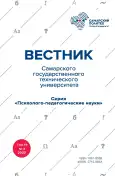The main methodological approaches to the formation of universal competencies of students of technical universities
- Authors: Tuchkova A.S.1
-
Affiliations:
- Volga Region State University of Telecommunications and Informatics
- Issue: Vol 19, No 4 (2022)
- Pages: 31-46
- Section: Theory of pedagogy
- URL: https://journal-vniispk.ru/1991-8569/article/view/255349
- DOI: https://doi.org/10.17673/vsgtu-pps.2022.4.3
- ID: 255349
Cite item
Full Text
Abstract
The paper highlights the theoretical provisions describing the main methodological approaches to the formation of competencies, which are provided for by modern federal state educational standards of higher education, taking into account professional standards (FGOS HE (3++)) — bachelor’s degree in the areas of training of the enlarged group 090000 Computer Science and Computer engineering: competence, system-activity and information approaches in education and pedagogical science. The differences between the analyzed FGOS in (3++) and earlier educational standards in the aspect of the formed results of educational activity are highlighted. The concept of competence itself is clarified, the views of scientists on the content of this term given in domestic and foreign literature are analyzed. The result of educational activity is considered as a set of competencies formed in the process of educational activity aimed at the implementation and application of professional skills of a future specialist in a certain subject area. Attention is drawn to the possibilities of the listed methodological approaches to the organization and implementation of the educational process in the formation of interdisciplinary and suprasubject competencies, which is required by modern conditions: the future specialist must be competitive, meet the needs of the employer, have opportunities for self-realization, etc. these opportunities are described by the example of curricula adopted for implementation in the Volga State University of Telecommunications and computer science». The necessity of integration of individual approaches in order to effectively implement educational activities is substantiated. It is noted that the need for effective organization of the modern digital educational process requires scientific justification. In this regard, the development of digital didactics, a new and relevant direction of pedagogical science, is being noted today.
Full Text
##article.viewOnOriginalSite##About the authors
Anna S. Tuchkova
Volga Region State University of Telecommunications and Informatics
Author for correspondence.
Email: annatuchkova2014@gmail.com
Russian Federation, Samara
References
- Loshkareva E, Luksha P, Ninenko I, et al. Chto nuzhno znat’ i umet’ v novom slozhnom mire. 93 p. [cited: 2022 May 5]. Available at: http (In Russ.)
- Khutorskoi AV. Kompetentnostnyi podkhod v obuchenii: nauchno-metodicheskoe posobie. Moscow: Izdatel’stvo «Ehidos», 2013. 73 p. (In Russ.)
- Azimov EhG, Shchukin AN. Novyi slovar’ metodicheskikh terminov i ponyatii (teoriya i praktika obucheniya yazykam). Moscow: Izdatel’stvo IKAR, 2009. 448 p. (In Russ.)
- Frolov YuV, Makhotin DA. Kompetentnostnaya model’ kak osnova otsenki kachestva podgotovki spetsialistov. Higher Education Today. 2004;(8):34–41. (In Russ.)
- Zimnyaya IA. Klyuchevye kompetentnosti kak rezul’tativno-tselevaya osnova kompetentnostnogo podkhoda v obrazovanii. Moscow: Issledovatel’skii tsentr problem kachestva podgotovki spetsialistov, 2004. 42 p. (In Russ.)
- Seryakova SB. Kompetentnosnyi podkhod v obrazovanii: ot teorii k praktike. Informatsiya i obrazovanie: granitsy kommunikatsii. 2011;(3):121–125. (In Russ.)
- Tatur YuG. Kompetentnost’ v strukture modeli kachestva podgotovki spetsialistov. Higher Education Today. 2004;(3):20–26. (In Russ.)
- Raven J. Competence in modern society. Its identification, Development and Release. Moscow: Kogito-Tsentr, 2002. P. 281–296. (In Russ.)
- Baidenko VI. Kompetentnostnyi podkhod k proektirovaniyu gosudarstvennykh obrazovatel’nykh standartov vysshego professional’nogo obrazovaniya (metodologicheskie i metodicheskie voprosy): metodicheskoe posobie. Moscow: Issledovatel’skii tsentr problem kachestva podgotovki spetsialistov, 2005. 72 p. (In Russ.)
- Zeer EhF. Kompetentnostnyi podkhod v obrazovanii. The Education and Science Journal. 2005;(3):27–40. (In Russ.)
- Medvedev VP, Tatur YuG. Podgotovka prepodavatelya vysshei shkoly: kompetentnostnyi podkhod. Higher education in Russia. 2007;(11):46–56. (In Russ.)
- Khutorskoi AV. Klyuchevye kompetentsii kak komponent lichnostno-orientirovannoi paradigmy obrazovaniya. Narodnoe obrazovanie. 2003;(2):58–64. (In Russ.)
- Bolotov VA, Serikov VV. Kompetentnostnaya model’: ot idei k obrazovatel’noi programme. Pedagogika. 2003;(10):8–14. (In Russ.)
- Baranova EV, Laptev VV, Simonova IV. Pedagogicheskaya kompetentnost’ magistrov informatsionnykh tekhnologii. Professional’noe obrazovanie. Stolitsa. 2011;(11):8–11. (In Russ.)
- Kogan EYa. Kompetentnostnyi podkhod i novoe kachestvo obrazovaniya. Velikanova AV, editor. Sovremennye podkhody k kompetentnostno-orientirovannomu obrazovaniyu: materialy seminara. Samara: Profi, 2001. P. 28–32. (In Russ.)
- Kuz’mina NV. Professionalizm lichnosti prepodavatelya i mastera proizvodstvennogo obucheniya. Moscow: Vysshaya shkola, 1990. 117 p. (In Russ.)
- Kraevskii VV, Berezhnova EV. Metodologiya pedagogiki: novyi ehtap: uchebnoe posobie. Moscow: Izdatel’skii tsentr «Akademiya», 2006. 49 p. (In Russ.)
- Novikova GP. Metodologicheskie podkhody k issledovaniyu innovatsionnykh protsessov v obrazovanii: sistemno-deyatel’nostnyi podkhod. Proceeding of the VI International science conference: «Evropa i sovremennaya Rossiya. Integrativnaya funktsiya pedagogicheskoi nauki v edinom obrazovatel’nom prostranstve»; 2009 Aug 19–20; Rimini. Moscow: MANPO, 2009. P. 36–38. (In Russ.)
- Shtan’ko VI. Informatsiya. Myshlenie. Tselostnost’: monografiya. Kharkiv, 1992. 144 p. (In Russ.)
- Gileva TA. Digital economy competencies and skills: staff development program design. Bulletin USPTU. Science, education, economy. Series economy. 2019;(2):22–35. (In Russ.) doi: 10.17122/2541-8904-2019-2-28-22-35
Supplementary files







